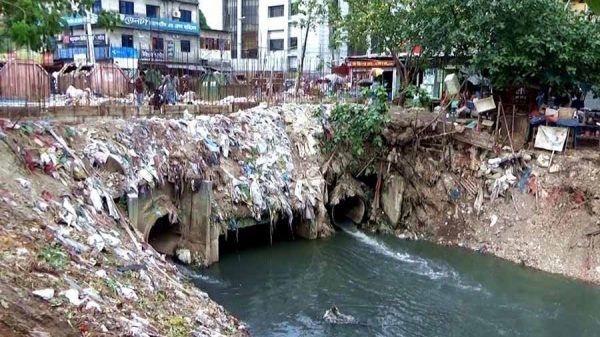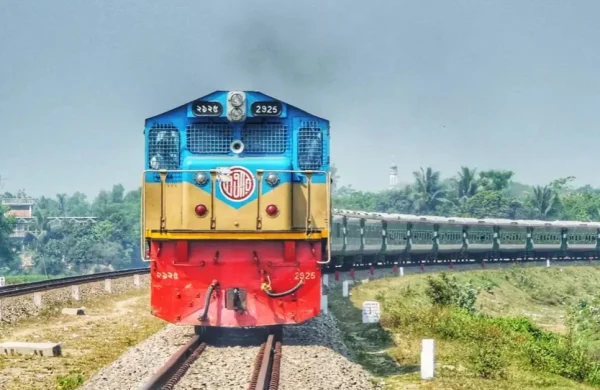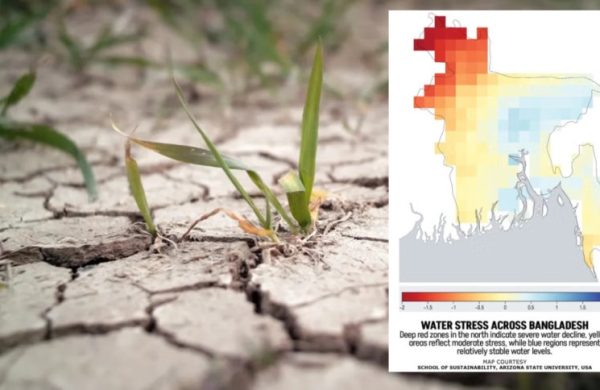Canal pollution goes on unabated
- Update Time : Monday, September 12, 2022

Swarnomoyee Mostafa Oishy:
City dwellers have been facing manifold problems including water stagnation and massive breeding of mosquitoes like Dengue and Chikungunya due to continuous pollution of canals located in and around the capital.
Locals said, the word ‘pollution’ has become complementary with the capital’s canals. The concerned authorities have been cleaning these canals for years, but within a few days, both sides of the canals have turned into garbage heaps again. As a result, rain water can’t remove smoothly for want of flow in the canals as well as water stagnation is being created. Besides, the mosquito breeding is increasing day after day spreading Dengue and Chikunguniya.
It is mentionable that, despite the rainy season, most of the canals including Shyampur, Zia Sarani and Qutubkhali canals in the capital are facing such as situation as the water can’t remove through those after heavy rainfall. Therefore, water-logging is created submerging most of the streets in the capital. Vehicle movement is being hampered leading small and big shaped accidents.
The above mentioned three canals are under the jurisdiction of Dhaka South City Corporation (DSCC). The waste management department of DSCC started cleaning the canals soon after taking over from WASA in December 2020.
In the last two and a half years, there have been conducted several rounds of cleaning operations. But after only a few weeks, the canals returned to their old appearance. Those concerned said that, the matter is not being resolved because of the lack of legal action against the canal grabbers and polluters.
There is a directive that, every canal in the capital will be cleaned by the two city corporation authorities in a regular base. But it is not becoming possible to keep those free from pollution. As a result, water-logging is being created at different places in the capital just after a little rain as the water can’t remove smoothly due to abnormal pollution on the mouths of the canals. Water getting stuck up that creating water stagnation at places. Consequently, vehicular movement on different roads is being hampered, while pedestrians including city dwellers suffer immensely.
Local complained that, if the canals are once cleaned, those are polluted again within a few days due to lack of monitoring. Laws are not properly enforced to prevent pollution. Due to which, the city dwellers do not get the benefits of canal cleaning. On the contrary, the expenditure of the city corporation in this sector is increasing over the years.

At present, there are 11 canals under DSCC and 29 under Dhaka North City Corporation (DNCC). Along with running a crush program for cleaning the canals, regular cleaning activities are conducted at different times of the year. Especially during the dengue season, separate canal cleaning operations are conducted to prevent breeding of Aedes. But after a few days, the canals are again affected by pollution.
When asked about the cause of the canal becoming polluted again after cleaning, the waste management department officials of the two cities said that, there is a need to be more strategic in canal management. It is never possible to keep the canals clean, if the common people are not aware or if the law is not properly enforced.
A senior DSCC official said, the city corporation must exercise its own legal powers to keep the canal pollution-free. Just as Aedes mosquito larvae are detected in people’s homes, operations are carried out to prevent the price hike of goods in the market, in the same way, carrying out operation is needed to combat noise pollution, air pollution and canal pollution in the capital. If such drive continues, it will help to create public awareness in this regard.
People will know that, they will be punished, if they pollute the canals. When asked about the legal powers of the City Corporation to prevent canal pollution, multiple regional executive officers of the two city corporations said, “We can take action against canal polluters, if we want. But it is not done due to lack of circulation of the subject. Moreover, no instructions have come from the higher authorities in this regard.”
However, if legal powers are applied to prevent canal pollution, these officials also think that common people will be aware that canal pollution is a punishable crime.
Chief Executive Officer of DNCC Salim Reza said, “We are working to prevent canal pollution. CCTV cameras are being installed on different points of the canals’ both banks. Effort to etermining the boundary of the canal is going on. But enforcement of law against canal polluters is a bit more complicated. That is why, it is not possible to take action in this regard.
Stating that there are complications in applying legal powers to prevent canal pollution, several officials of the two cities said that, when the magistrate was there, maybe no one threw garbage or someone suddenly threw a bag of garbage, the matter is difficult to grasp. Taking these issues into consideration, the City Corporation is not interested in applying legal powers to prevent pollution.
Executive Engineer of DSCC waste management department Mohammad Shafiullah Siddiq Bhuiyan told that, “There are many examples of imposing fines for canal pollution in outside of the world. City Corporation is conducting some activities to increase public awareness to prevent pollution. Of them, conducting mobile courts, realizing fines and punishments are also part of raising public awareness. If someone starts the matter, he or she will get results, the tendency of people to pollute the canal may be decreased.”
Bangladesh Environmental Lawyers Association (BELA) Chief Executive Syeda Rizwana Hasan said, “It is the right time to enforce strict laws against canal polluters. The City Corporation Act provides for fines and penalties against canal polluters. But that practice has not started yet. But now vigorous legal action should be taken. There are many examples in the world, of maintaining the beauty of canals and rivers by penalizing and fining polluters. It is very important to start this practice in our country especially in the case of endangered canals including the capital.”















